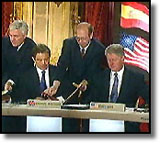
|
A Special Relationship?The meeting between Tony Blair and Bill Clinton may lead to a revival of the "special relationship" that has often characterised relations between Britain and the US since the Second World War.In recent times the relationship was at its strongest when Margaret Thatcher was joined on the world stage by President Ronald Reagan. Their close friendship was based on shared political ideals combined with mutual admiration. Margaret Thatcher strove to make Britain America's closest allie. America supported Britain in the Falklands conflict, a favour which was returned when Mrs Thatcher became the only Western leader to endorse the President's decision to retaliate against international terrorism by bombing Libya in 1986. When President Reagan left office in 1989, relations between the two countries although never poor, cooled slightly. The high point in US UK relations under Reagan's successor in the White House, George Bush, took place during the Gulf War which re-affirmed the US perception of Britain as one of its most trusted friends. Relations hit a low when John Major supported Bush's bid for a second term. Bush was defeated and the incoming President, Bill Clinton was not pleased with the Conservatives' role in digging up politically damaging information on Mr Clinton's time in England as a student. Differences between the two leaders over Bosnia and Northern Ireland did little to improve relations. Northern Ireland has been the most contentious issue between the two nations in recent years. Britain openly expressed its displeasure at the granting of a US visa to Sinn Fein leader Gerry Adams and the lifting of a US fund-raising ban on Sinn Fein in 1995. Despite domestic pressures and a successful visit to Northern Ireland, President Clinton now appears less willing to become involved in the issue, at least at the moment, and relations are on a sounder footing.
With Tony Blair in Number 10 there are signs that the personal warmth which characterised the Thatcher/Reagan era, will return. Although the two men clearly got on with each, this friendship will not result in any substantive change in US foreign policy. Mr Clinton and Mr Blair have met only a few times, most recently in Washington in April 1996 and in London in November 1995. President Clinton also phoned Mr Blair on the night of his election victory. A number of senior Labour figures have links to Washington, notably Jonathan Powell, Chief of Staff at Downing Street and a former Political Secretary at the British Embassy in Washington. Labour pollster, Philip Gould, has been a frequent visitor to the US capital and his opposite number, Stanley Greenberg, Clinton's 1992 pollster, worked at Labour Headquarters during the 1997 election campaign. President Clinton's Secretary of State, Madeleine Albright, also spent time in Britain during the second world war but has no strong attachment. As well as Northern Ireland, there are a number of differences between the US and the UK, including the Helms-Burton Act and attitudes towards Iran. The US is also increasingly focused on Asia in its foreign policy. Europe tends to be viewed through the prism of concerns over Russian security and Eastern European development, although culturally the US and UK still have much in common.
|
Diana, Princess of Wales, 1961-1997
Conference 97
Devolution
The Archive
News |
Issues |
Background |
Parties |
Analysis |
TV/Radio/Web
Interactive |
Forum |
Live |
About This Site
News |
Issues |
Background |
Parties |
Analysis |
TV/Radio/Web
Interactive |
Forum |
Live |
About This Site
© BBC 1997 |
politics97@bbc.co.uk |

